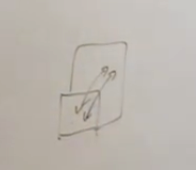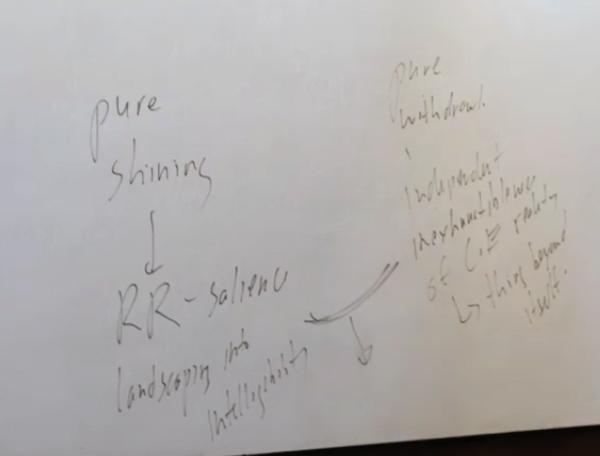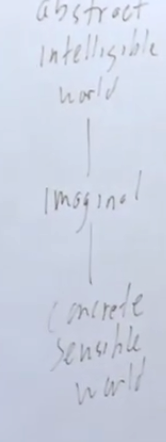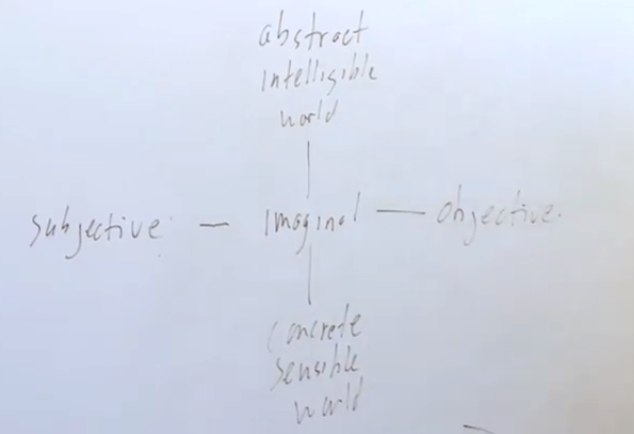my notes
- The thing beyond itself
- Realness as simultaneously the shining into our framing and the withdrawing beyond our framing in a deeply interfording interpenetrating manner
- Truth as Alefea (sp?) that which grounds the agent arena relationship in atunement, allows us to remember being, getting into attunement with its simultaneous disclosure and withdrawal
- Can forget the being mode, get trapped in the having mode, project of using truth as correctness, misunderstand being as a particular Being, try to capture the unlimitedness aspect of being but only do it at the limit, only understand being as a Supreme Being
- Understand God as the Supreme Being - ontottheology
- Ontotheology: way of understanding being gets us into the deep forgetfulness and modal confusion that is the hallmark of nihilism
- Corbin: gnosis: what would it be like to remember the being mode
Heidegger and Physis
- Heidegger’s commentary on poetry Selucius (sp?), put into poetry work of Meister Eckart
- Eckart: experiencing this as a form of sacredness, appropriate to religious context
- Poem:
- The rose is without why,
- It blooms because it blooms
- It cares not for itself
- Asks not if it is seen.
- Physis: blossoming forth from itself: greek core of the word physics, trying to get back to a re-experience of the physical as an important way of remembering being mode
- H not rejecting the physical but showing how it can moredeeply be remembered.
- H: the blossoming of the rose is grounded in itself, pure emerging out of itself
- Get a sense of the depth of the rose in its physis: as it shines, shines in a way that its shining out of itself, it withdraws as it presents itself to our phenomenological experience
- Maxim: live without why, live without a why
- Is the quest for the grand culminating purpose coming from the having mode, not the being mode
Narrative and Teleology
- H proposing a non-teleological way of being: there’s no narrative to the rose, it’s above and beyond the narrative
- V: perhaps we can’t get back to a narrative in the sense of a teleological aspect
- Perhaps the universe is like the rose: maybe it’s blooming from itself, grounded in itself, shining from itself while always withdrawing.
(Nick wanted V’s metaphysics! Here it is!)
- Ever expanding universe, coming out of the big bang but grounded in the quantum
- We get better at being connected to its Physis if we drop the axial age requirement that there be a teleological narrative to it all
- Narrative gives us important practice in something - gives cognitive existential practice in non-logical identity
- Relationship it has to symbol: frame then transframe, nonlogical identity between the word inside the frame and the world outside the frame, and a non-logical identity between you and you there

-
Narrative is a way of representing through time, symbolically, represents how have a non-logical identity to yourself
-
V was born in Hamilton, he’s not that kid anymore, but in another sense its him.
-
Narrative is a way of tracing out and training us in non-logical identity, work with this fundamental transformation
-
Think Eckart pointing to that we can exact that ability for non-logical identity, we can exact that symbolic identity and instead think of it as unfolding across time
-
Stoics: stop pursuing fame and glory and wealth and power
-
Instead of horizontal narrative we can do the vertical ontology in which connecting the depths of ourselves to the depths of being in a non-teleology being mode.
(Argh! Does this mean something? This seems like something that can only be grasped through a psycho-technology exercise. I don’t know what it means. Can’t grock it)
- V thinks this is what Heidegger and Eckart pointing to
- Pure shining - phenomenon - experience → RR
- RR = shining: the salience landscaping into intelligibility
(But before RR = intelligence, how can it also equal this “shinning” - I’m not sure I’ve grasped the metaphor for shining.)
- Pure withdrawal - the independent, inexhaustibleness of a combinatorially explosive reality, we cannot drink it dry, the things beyond themselves
(is inexhaustible a feature of reality or our relationship to reality?)
- V thinks we can draw these two together

- A trajectory of transframing that is always closing upon the relevant while always opening to the moreness
- When we recognize that, remember it aletheia from the being mode, accentuate it, celebrate it, that’s what he argues sacredness is
- Seems to line up with Eckart, H more reticent to talk in terms of sacredness, Tillich isn’t
- We can think of realness as a tonos - this creative tension between, confirmation, coherence and moreness
- If the virtual reality just has the confirmation and coherence it falls flat if it can’t provoke a sense of open wonder, if there’s no element of surprise, if it’s all a simulation and no accommodation (experience of awe and wonder), if just the foreclosure and never just the opening, if its just the homing and never the numinous then it’s not real, it’s not experienced as real.
(Ok! Again: he seems to be confounding what is real and the experience of what is real. Realness cannot be based on our experience, though we can use our experience to help determine what is real. I don’t know why the experience of wonder has to come in or something isn’t real. I can’t tell if he’s on to something here but I’m having real problems with this conception of realness. I get it as sacredness. But why mix the two. It seems to be an unnecessary and unhelpful redefinition of what is real. But it may be very useful in terms of sacredness)
- Daoism: yin the confirming, drawing down, the yang the opening up, both interpenetrate. Discloses the inexhaustibleness of the Dao
- Daoism is about the serious play of being
- That’s how Corbin describes it: gnosis: the play of being
Corbin and Persian Sufism
- Corbin focusses on Neoplatonism within persian sufism (mystical branch of islam)
- Corbin helps us remember persian philosophy, overcome our ethnocentrism
- Persia central role between the Arab, European, India, Chinese worlds
- Persian suffism: Iran today islamic totatlitarian regime, but not a monolith, Persia made muslim by an arab invasion, Persians reemember this deeply to this day
- Persians attracted to sufism, because trying to find a form of liberation from an oppressive arab empire
- Important that it is Persian sufism
- Reading thee poetry of ancient and since the Arab invasion, re-remember
- Corbin read this stuff deeply
- Corbin misunderstands some of this literature
- C draws in Heidegger and neo-platonism, impact on sufism, trying to explain this gnosis and how it can be redemptive in the face of the meaning crisis
Corbin, Gnosis and the Imaginal
- Corbin: the recovery of Gnosis is abound up in imagination
- Corbin not using the term in the normal way. Makes the distinction between the imaginary and the imaginal
- Imaginal: bound up with gnosis
- Imaginary: what we typically mean, the subjective experience of generating inner mental imagery which we know is not real, completely in our control, play with it as we wish - not what Corbin is talking about
- Two ways we represent, come into cognitive contact with reality
- Abstract representations, the intelligible world, grasp reality through mathematical formula, through intellect
- Concrete: sensible world
- Imaginal: mediates between the abstract and concrete, bridges between them, allows them to come together in meaningfully structured experience
- In my phenomenological experience there is intelligible order that I can extract intellectually but also I come into sensual contact concretely with things.

- Abstract - world of mind, concrete world of matter - cartesian division, Corbin argues lost the imaginal that bridges between the mind and material
- Imaginal always bridges between the purely subjective and objective - imaginal is transjective in nature

- Then whole thing in motion. Imaginal not constant. It’s in constant transformative transframing
- It is vibrant and vital in that way.
- Because of the centrality of the imaginal to Corbin, he was deeply opposed to fundamentalism and literalism → they make this static, they put things into either abstract or concrete or just subjectivity or objectivity, lose the nexus of the imaginal
- Corbin: if lose the imaginal, lose the capacity for gnosis, and then lose capacity for waking up within the bing mode through aletheia and the ground of being and sacredness
- This is something going to keep seeing. Deep opponent to fundamentalism and literalism
- Seeing a potential way of seeing Heidegger’s critique of ontotheology: we have the Supreme Being and we have our propositions about this ultimate being, we can think the way in which we should be is to have these propositions in a fundamentalist, literalist fashion then lose all of this
- Will hear symbolic as a dismissive term, no real relevance. Corbin arguing that if do that have lost capacity for gnosis, lost capacity to overcome the forgetfulness of being
- Jonathan Pageau exemplifying this, should not be dismissive of the symbol, not interpret it as merely subjective or reject it because can’t make it clearly objective for us
Imaginal and Symbolism
- To connect imaginal to dasein (your being in the world) - self knowledge and participatory knowing of being are interpenetrating and knowing together - have to bring out something of Corbin easy to misread, pushes buttons in way V doeesn’t like, but sense that pushed in a way that need to be pushed in order to wear free from them
(this is the sense I get from a lot of V’s stuff in these lectures. There’s stuff I don’t quite get but I suspect there is something there that will help me break free from my own self-imposed chains. But I haven’t quite grasped it yet.)
- Corbin really does pick up on the sense of sacredness goes on in the imaginal
- Symbol: look at it and through it, symbol is translucent - can put those two in an important dialogue - that is how the symbol can help capture the nonlogical identity between the agent arena now in this frame and the agent arena in a more comprehensive encompassing frame
- Symbols: transjective: trying to make them either subjective or objective is having mode dismissal of how the symbol trying to challenge you to transcend it
- If you are not transcending in response to a symbol you really aren’t understanding it
(I’m still pretty uncertain of what “transcending” entails)
- If treat it as an allegory that you can replace with other literal terms then you haven’t really remembered through the symbol - there has been no Aletheia
- In the pursuit of the correctness of truth then you have forgotten the aletheia
- Symbol: trajective: putting you on a trajectory
- Symbol: transformative: transformative of the inner man, of you at a fundamental level
- Symbol: transspatial: movement between worlds, ontological movement between smaller frame and large frame, ontological shift, not movement through time
- Alafaya: through the symbol, that’s how you do gnosis
The Symbol of the Angel and the Divine Double
- The Angel: most important symbol for Corbin
- Standard rolling of the eyes at this represents the imaginary understanding of the angel
- Corbin using this term because it fills the Persian sufism literature
- V proposing alternative way of understanding this
- Stang, Our Divine Double
- Becomes prevalent through mediterarian spirituality through the hellenistic and post hellenistic period
- Decadent romantic way of thinking: born with true self, have to be true to your true self, and have express it, that’s what it means to be authentic, pervasive in our culture
- In the mediteranian: I’m here and I have a self right now, soul, spirit, it is bound to the divine double, there is a double of me that is archetypically more important than me, true self is my DD, path is to reunite myself with my double
- Realization of their interdependence culminates in a mystical union
- Gnostic: transgressive, break the grammar of thinking your true self as something you have, is in you, have to express it, true self beyond you, aspire to it. Not something you have, something you realize through being mode, not the having mode of inner possession
- DD pervasive mythos
- Corbin’s use of Angel as symbolic was of referring to DD
- Aspirational process central to our mythos of how we are going to normatively improve ourselves
- In one sense DD is a crazy idea, if see it as part of two-world mythology
- But maybe not crazy idea if ask should I believe that, first ask why did so many people believe it, what was going on there, what was it doing?
- LA Paul: transformative experience
- Agnes Collard; Aspiration: arguing for neglected form of rationality, best described as aspiration. Rationality means any systematically reliable internalized psychotechnology that reliably and systematically affords you overcoming self-deception and affords you cultivating enhanced connectivenss enhanced meaning in life
- This version of rationality points to the cultivation of wisdom
- Self before and Self after
- With any genuine qualitative development (why I am so different in kind from that kid born) what I can know, can be, not how much) - non-logical identity
- Not an identity relationship that can be captured by A = A
- Cannot reason our way or infer our way through this
- What is the nature of the relation? Collard thinks its aspirational, involves aspiration
- If you don’t include aspiration as part of rationality going to get into a self-refuting position. My relationship to rationality and my relationship to wisdom are aspirational
- I am aspiring to become rational, because I am not currently that rational - if aspiration isn’t rational get into a weird kind of self-refutation
- Getting back to the platonic idea of the deep interpenetration between love and reason
- Same with wisdom
- Liberal education is gnosis, don’t know what its going to be life
- This is the relationship between the existing self and the divine double, the DD is the symbol that allows you to move from yourself then to yourself now - to the better self
- Corbin’s talk about the angel is way of him invoking and bringing into activity all of the stuff about symbolism, integrate it with this process of aspirational rationality that is central to self-transcendence and central to us becoming more rational and more wise



